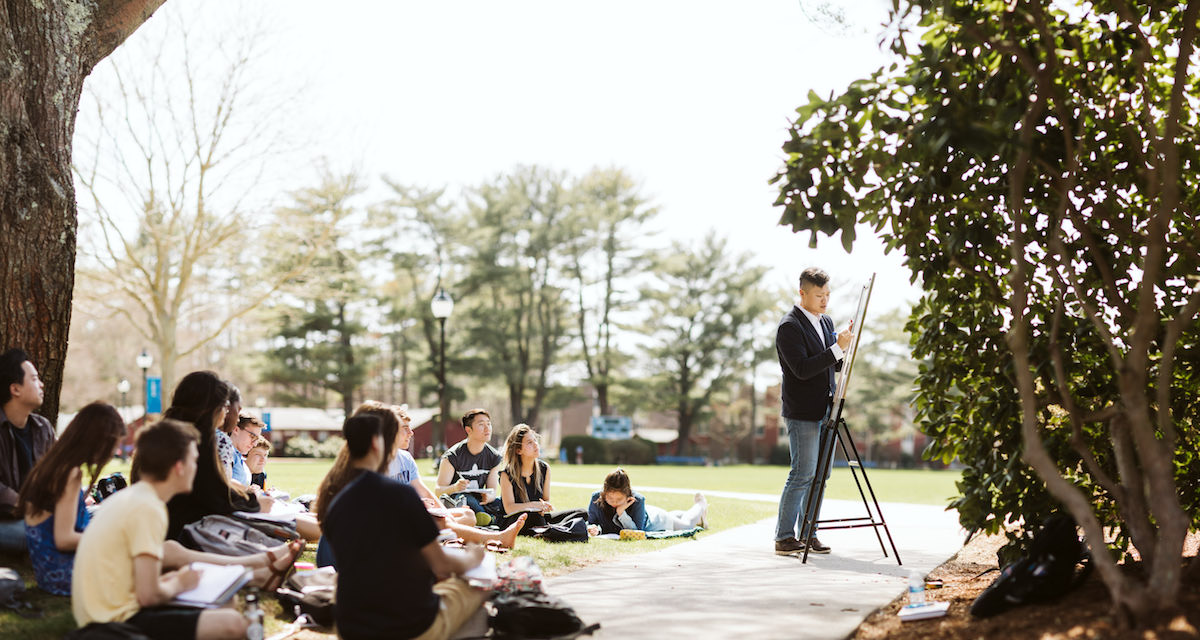When All Colleges Start to Look the Same
This year, precisely 384 “best colleges” made the cut for the Princeton Review’s annual publication, and 151 colleges in the United States, Gordon included, touted their 11:1 student-to-faculty ratio (or lower). While statistics and fun facts can make for a good conversation starter, on their own they don’t define a school—the same way a GPA doesn’t define a student, or how the height and weight listed on a driver’s license can’t actually tell you how good of a driver a person is.
So, with that in mind, how can you really tell one college from another—especially when said college resorts to using another high-res picture of a charming professor teaching a class outside on a sunny day beneath a real—yet proverbial—wise, old, oak tree?
You don’t need to look too hard to find name-drop internships, stellar research opportunities, tight-knit communities and intellectual prowess. But college really isn’t a one-size-fits-all kind of thing. So, how do you begin to tell these colleges apart? And, maybe more importantly, how do you begin to tell which one is right for you?
Colleges with child locks
All colleges and universities fall on a spectrum when it comes to the subject of religious faith. At one end there are colleges that want you to learn about everything except God and, at the other end, there are colleges that want you to learn about their interpretation of God and little else. They both have restrictions—their own version of a child lock or a “do not enter” sign. If you want an education that doesn’t fall prey to these extremes, then you have to end up somewhere in the middle where faith and learning aren’t separate entities.
Colleges without them
When your education comes without a child lock, you’re free to ask any kind of question. Because of this, you learn to ask better questions, step outside your own point of view, think for yourself, have a good conversation with someone you might not agree with, and ultimately develop a deeper, more complete understanding of the world around you.
So much more than career prep
Many colleges will give you a set of skills that will take you somewhere you want to go (be it a job or graduate study). And that’s essential. But being a working person is only one facet of who you are, so an education ought to do more than make you employable. Plus, the jobs of today will not be the jobs of tomorrow. It’s likely the workplace will look totally different by the time you’re deep in it. So, learning the skills that apply to every kind of work—critical and creative thinking, logical reasoning, persuasive communication—are increasingly necessary. That’s where purpose and this idea of vocational preparation come in.
A greater purpose
Chances are you’ve seen the word “purpose”a lot in college promos. For some schools, purpose is synonymous with a successful career, a socially responsible (yet individually centered) lifestyle, and the motivation to, in fact, make the world a better place—all of which are good. Very few definitions have to do with a greater purpose: a call to join in God’s redemptive work around the world. When the love of neighbor and love of God guide our understanding of vocation, the process of personal discovery is not abstract or entirely unknown to us. And, so conversations about calling are worked into an existing narrative. While there’s mystery and freedom in how you fit into this bigger narrative, it’s nice to have people—like mentors—who can ask you the important questions and guide you along the path of self-discovery, while knowing there’s more to life than making money and keeping a record of personal achievements.
Real life, real people
A lot of this is abstract in nature, so it’s helpful to reference real examples. It’s pretty easy to tell where colleges fall on the spectrum when you read stories about their students, faculty and alumni. For starters, you can easily ask yourself the questions:
- Do they ask or entertain thought-provoking questions?
- Is faith talked about? If so, are there constraints? Do the stories tell the reader what to think theologically? Or is it open to interpretation?
- Is the kind of preparation they’re marketing for a career plan or a life plan?
- How do they portray success?
- Do they talk about “purpose”? If so, is it clear what they mean by it? Do they try to place it in the context of something bigger? Do they encourage you to find yours?
Telling them apart
So, while a student-to-faculty ratio is a helpful metric for understanding the level of personalized attention you’ll receive at a college, there’s a lot more behind the number. Behind every student-to-faculty ratio, there are real professors. Are they the type of professors you’ll thank on an acknowledgements page of a book or name aloud when telling your life story? That’s worth thinking about. With every factoid, there’s a deeper story. It’s up to you to find it.
 The Bell
The Bell